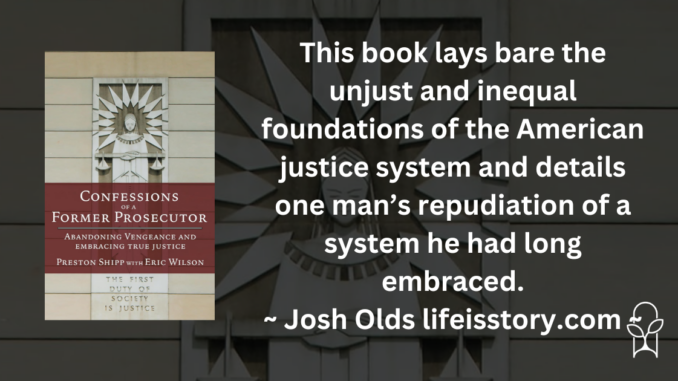
Also by this author: 1 Step Away, The Best of Evil, A Shred of Truth, Expiration Date, Dark to Mortal Eyes, American Leftovers, What Are You Going to Do?: The Inspiring Story of Everett Swanson and the Founding of Compassion International, What Are You Going to Do?: How One Simple Question Transformed Lives Around the World: The Inspiring Story of Everett Swanson and the Founding of Compassion International, What Are You Going to Do?: How One Simple Question Transformed Lives Around the World: The Inspiring Story of Everett Swanson and the Founding of Compassion International, Taming the Beast: The Untold Story of Mike Tyson
Published by Chalice Press on April 23, 2024
Genres: Non-Fiction, Biography, Memoir
Buy on Amazon
Goodreads

Once an Assistant Attorney General in Tennessee, Preston Shipp found his convictions challenged after teaching criminal justice courses to inmates from the Tennessee Prison for Women. He resigned from prosecuting and continued teaching. Soon after leaving, an exceptional individual, Cyntoia Brown, joined his class. Shipp believed she deserved a chance at redemption--only to receive a brief on a years-old murder and robbery case in which he himself had argued for a life sentence for 16-year-old Cyntoia Brown. Out of guilt and empathy, Shipp embarked on a decade-long journey to free Ms. Brown and while traveling his own path to redemption. Today, he dedicates his efforts to the Campaign for the Fair Sentencing of Youth, which has led to more than 1,000 people receiving a new chance at life after being sentenced to life imprisonment even though they were under the age of 18. Shipp shares his views on how the American justice system is in desperate need of reform, especially for juveniles.
Stare too closely at the American justice system and you’ll soon be confronted with the reality that it is anything but just. Preston Shipp entered the system as a full believer in law and order. His job as a prosecutor was to lock bad guys up and throw away the key. With the full weight of the state behind him, his purpose was to get people declared guilty and put away for the longest time possible. That was what justice meant.
But, over time, Shipp’s mindset began to change. An invitation from a former mentor to work in prison ministry put Shipp directly in contact with the people he had been putting away. Confessions of a Former Prosecutor tells the story of that change and how actually interacting with the incarcerated as people completely changed his view of the justice system.
I feel like a lot of stories of this nature come from the perspective of the defense—Just Mercy, Anatomy of Injustice, The New Jim Crow—the story is always about the plucky, undersized David of a defense team taking on the giant of injustice perpetuated by the State. The focus is on the fight with the assumption that the prosecution isn’t going to change. Confessions of a Former Prosecutor is a story of a prosecutor who did.
Shipp, along with coauthor Eric Wilson, deftly weave between the biographical narrative and expositing the book’s themes to show how what Shipp was confronting wasn’t unique to his situation. Shipp takes readers on a journey behind the unparalleled power of the prosecutor to determine what charges are brought and what punishment is sought. He highlights the disparity between the resources available to the State and the resources available to defendants who are usually relying on public defenders. He pinpoints the impersonality under the guise of impartiality that guides it all, writing “This is the job of a prosecutor, to make arguments to judges and juries about the gate of people you don’t know…Often the only thing they know about these people is the worst thing they have ever done.”
And this is an interesting point: Confessions of a Former Prosecutor does not argue that the justice system is adjudicating guilt or innocence incorrectly. He’s saying that the system, working as intended, is often getting the calls right—but the punishment it levies does not bring about justice. That’s the heart of this book. And that’s why Shipp felt compelled to leave his position as a prosecutor. He began to see the need for reconciliation over retribution.
There’s a powerful narrative thread that runs throughout the story. It’s one that drove Shipp’s transformation and if Hollywood wrote it they couldn’t make it any more dramatic. Paired with Shipp’s commentary on the lessons he’s learned since—basically his present self commentating on the events of his past self with present knowledge—the end result is not just an expose of what’s gone wrong but a well-defined and practical blueprint for how we can do better.
Confessions of a Former Prosecutor lays bare the unjust and inequal foundations of the American justice system and details one person’s repudiation of the system that he had wholeheartedly engaged. It is an outsider’s perspective with an insider’s knowledge. For Shipp, the system wasn’t something he could be a part of any longer. He couldn’t do his best to be the bright spot in a bad system. He had to get out of it completely. And in so doing he became an advocate for a more just form of justice—one that sees those accused of wrongdoing, learns their context, their stories, their humanity, and approaches justice out of a mindset of restoration rather than retribution.
